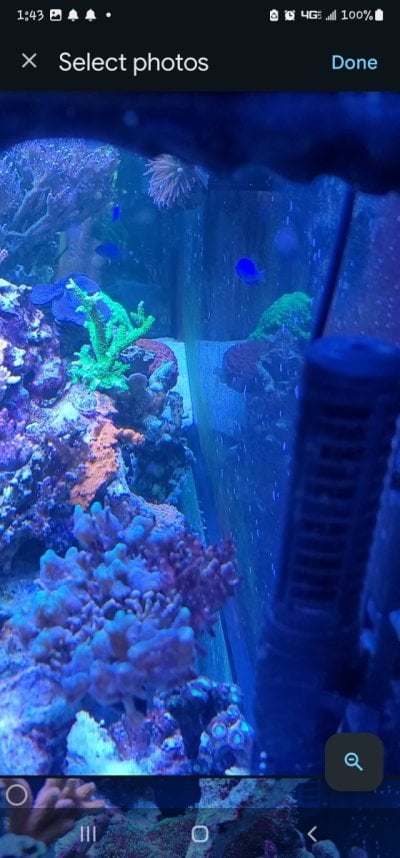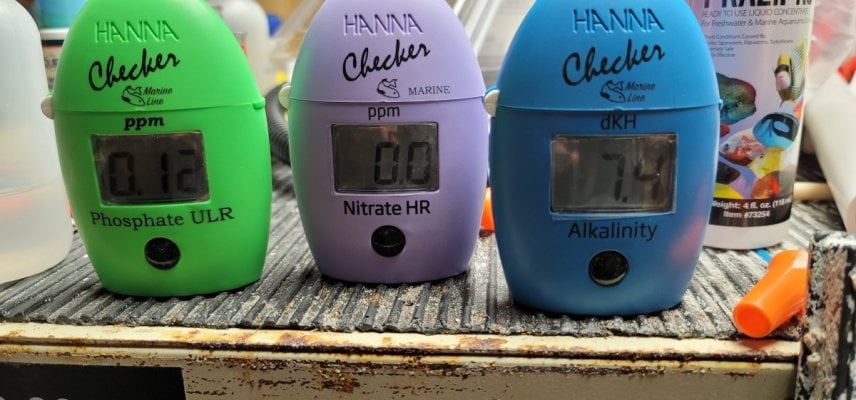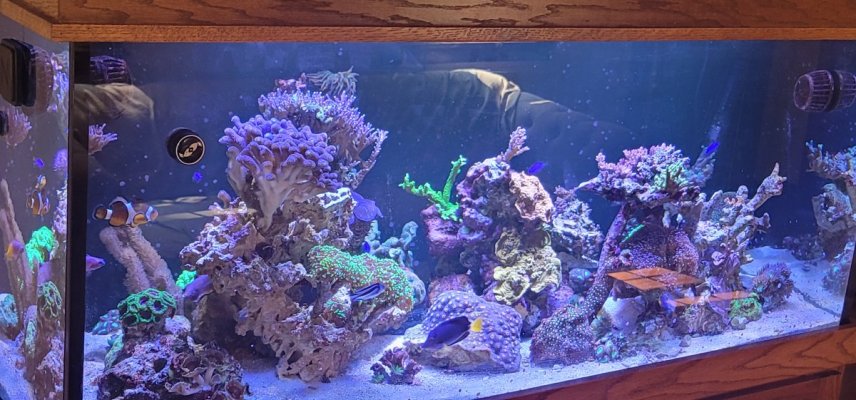We will just agree to disagree. Every tank is unique and if your system works for you then roll with it. For the majority of average recreational reefers bottomed out nutrients leads to dinos and dead corals. There are countless threads on here about it. As Randy stated it's good to have the nitrate cushion from complete 0. I wish you luck with your approach but will never consider it a mainstream approach to reefing for us average Joes.I would say no, back than low nutrients were hard to attain. I really didn’t understand how the deNO3 worked until I started reading Randy’s article about carbon dosing. Imo Randy both started and ended ULNS with carbon dosing or at least made it mainstream and understandable to the masses.
Navigation
Install the app
How to install the app on iOS
Follow along with the video below to see how to install our site as a web app on your home screen.
Note: This feature may not be available in some browsers.
More options
You are using an out of date browser. It may not display this or other websites correctly.
You should upgrade or use an alternative browser.
You should upgrade or use an alternative browser.
Will nitrate at 0 cause birdsnest to die?
Nice tank! Is that GSP on the lower left? My GSP grew over nearly everything around itEvery tank differs with needs and according to coral especially if SPS specific, mixed reef or softie tank. I run at nitrate 12 and here is my birdsnest upper left

Never claimed it to be universal, but that dude does have a huge patch of GSP in his tank. Did you look at his picture? This is simply anecdotal information I’m passing on as a possibility.Hmmm, if only I had GSP, then I'd know why I don't have no3.
HO HUM
But seriously, every tank is different than another.
When one has a success doing a certain thing, that does not make that thing, universal.
Yes, I get that.Never claimed it to be universal, but that dude does have a huge patch of GSP in his tank. Did you look at his picture? This is simply anecdotal information I’m passing on as a possibility.
No you didn't say it's universal.I know exactly what is wrong. GSP eats up nitrates like a sponge.
But you do claim it is definitely it, no questions asked.
He may be dosing or maybe not.
You maybe dosing or maybe not.
Every tank is different but it is something he can look into.
Thanks for the reply’s, I think the consensus is that it can’t hurt to have traceable nitrates so I’ve ordered Ammonium Bicarbonate. I will start dosing per Randy’s diy method to raise the nitrate level to at least measurable levels 5-10 and see how everything does. I will also frag a good part of the struggling coral just in case the entire colony doesn’t recover.
Randy Holmes-Farley
Reef Chemist
View Badges
Staff member
Super Moderator
Excellence Award
Expert Contributor
Article Contributor
R2R Research
My Tank Thread
Nice tank! Is that GSP on the lower left? My GSP grew over nearly everything around it
FWIW, I like gsp.
Ive had tanks the run no3 higher than 0. My 300 g with giant fish load ran 1-5 ppm even with a orp controlled sulfur deno3 and my best efforts to keep them lower. There was no discernable difference between these tank's corals. If reefers feel the need to chase numbers, especially one so insignificant as no3, so be it. However, just because the loudest people on Reef to Reef believe something doesn't make it true. My 300 with no3 test: dt and deno3 effluent.We will just agree to disagree. Every tank is unique and if your system works for you then roll with it. For the majority of average recreational reefers bottomed out nutrients leads to dinos and dead corals. There are countless threads on here about it. As Randy stated it's good to have the nitrate cushion from complete 0. I wish you luck with your approach but will never consider it a mainstream approach to reefing for us average Joes.
Randy Holmes-Farley
Reef Chemist
View Badges
Staff member
Super Moderator
Excellence Award
Expert Contributor
Article Contributor
R2R Research
My Tank Thread
Ive had tanks the run no3 higher than 0. My 300 g with giant fish load ran 1-5 ppm even If reefers feel the need to chase numbers, especially one so insignificant as no3, so be it. However, just because the loudest people on Reef to Reef believe something doesn't make it true.
But the fact that many tanks (not all) suffer at undetectable nitrate and that suffering is visibly reduced by adding N is good evidence. I really think you are extrapolating a certain scenario to other scenarios where it may be incorrect to do so.
All of us have a very narrow window of observations to build a foundation in this hobby. Maybe I build my systems with many fish, frequent feeding, and high export that no3 deviancy seem impossible? I question many “new” hobbyists who see a change after adding N and calls it evidence when in reality it is coincidence. I’m not willing to throw away decades of observation and research, books and articles from experts (including you) just because 10 ppm no3 is the current trend; imo you were ‘corrector’ 20 years ago. Not that it matters, but I would be more convinced if reefers tested the entire N cycle, not just the end point, while seeing a constant reduction of N on a stable reef before deciding there is a deficiency. If, for example in an established reef aquarium with detectable nh3, nh4, and no2 and undetectable no3 would you still recommend no3 additions? There is another thread here where the recommendation is to raise no3 to 20 ppm to solve the problem of a struggling new reef aquarium. Please tell me you would disagree otherwise I must have chosen the blue pill from Morpheus?But the fact that many tanks (not all) suffer at undetectable nitrate and that suffering is visibly reduced by adding N is good evidence. I really think you are extrapolating a certain scenario to other scenarios where it may be incorrect to do so.
Randy Holmes-Farley
Reef Chemist
View Badges
Staff member
Super Moderator
Excellence Award
Expert Contributor
Article Contributor
R2R Research
My Tank Thread
All of us have a very narrow window of observations to build a foundation in this hobby. Maybe I build my systems with many fish, frequent feeding, and high export that no3 deviancy seem impossible? I question many “new” hobbyists who see a change after adding N and calls it evidence when in reality it is coincidence. I’m not willing to throw away decades of observation and research, books and articles from experts (including you) just because 10 ppm no3 is the current trend; imo you were ‘corrector’ 20 years ago. Not that it matters, but I would be more convinced if reefers tested the entire N cycle, not just the end point, while seeing a constant reduction of N on a stable reef before deciding there is a deficiency. If, for example in an established reef aquarium with detectable nh3, nh4, and no2 and undetectable no3 would you still recommend no3 additions? There is another thread here where the recommendation is to raise no3 to 20 ppm to solve the problem of a struggling new reef aquarium. Please tell me you would disagree otherwise I must have chosen the blue pill from Morpheus?
Just reiterating, the potential difference is in the availability of ammonia and other N sources. Some tanks may have little besides nitrate, while other systems, such as a fish heavy system or those using heavy in heavy out, may have a lot more ammonia or particulates while not having more nitrate. I just don’t see using one system as an indicator of nitrate need in a different system where other N source may be greatly different.
I am not of the opinion that more than a few ppm nitrate is ever needed, and maybe not more than 2 ppm, hence my recommended 2-10 ppm nitrate range.
I don’t know what ammonia levels are needed or optimal, so I’m hesitant to comment on that.
I am not in disagreement with your recommendation, as I interpret it; “to insure adequate N a detectable amount of no3 is desirable, but not required in all cases.” I believe others, maybe novice reefers, read your recommendation and interpret it as, ‘undetectable no3 = dead corals, toxic Dinoflagellates”. Imo, the evidence is here in this very thread….your thoughts?Just reiterating, the potential difference is in the availability of ammonia and other N sources. Some tanks may have little besides nitrate, while other systems, such as a fish heavy system or those using heavy in heavy out, may have a lot more ammonia or particulates while not having more nitrate. I just don’t see using one system as an indicator of nitrate need in a different system where other N source may be greatly different.
I am not of the opinion that more than a few ppm nitrate is ever needed, and maybe not more than 2 ppm, hence my recommended 2-10 ppm nitrate range.
I don’t know what ammonia levels are needed or optimal, so I’m hesitant to comment on that.
I would love to always have 1 or 2 ppm no3 just for the reason to know I have enough.I am not in disagreement with your recommendation, as I interpret it; “to insure adequate N a detectable amount of no3 is desirable, but not required in all cases.” I believe others, maybe novice reefers, read your recommendation and interpret it as, ‘undetectable no3 = dead corals, toxic Dinoflagellates”. Imo, the evidence is here in this very thread….your thoughts?
But, IME, it's not the case for my system, and zero does not mean dead coral or dinos either.
I cannot say that for po4 though.
I agree, hence the eye test over flawed hobby test kits. I was just reading a thread with Emergency Heading over bottoming out nutrients. Please tell me this hobby isn’t filled with Taylor Swift Groupies!!!I would love to always have 1 or 2 ppm no3 just for the reason to know I have enough.
But, IME, it's not the case for my system, and zero does not mean dead coral or dinos either.
I cannot say that for po4 though.
Randy Holmes-Farley
Reef Chemist
View Badges
Staff member
Super Moderator
Excellence Award
Expert Contributor
Article Contributor
R2R Research
My Tank Thread
I am not in disagreement with your recommendation, as I interpret it; “to insure adequate N a detectable amount of no3 is desirable, but not required in all cases.” I believe others, maybe novice reefers, read your recommendation and interpret it as, ‘undetectable no3 = dead corals, toxic Dinoflagellates”. Imo, the evidence is here in this very thread….your thoughts?
Well, let’s turn it around. If I recommend 2-10 ppm nitrate as insurance, is there any evidence that 2-10 ppm nitrate is ever detrimental even when there are other adequate sources of N?
Imo, 2ppm no; 10ppm I might try to lower if a visual cue suggested something was wrong, otherwise I would not panic. To answer without my opinion, based on current hobby research, I would say 2-10 ppm no3 poses no risk even with other adequate source of N.Well, let’s turn it around. If I recommend 2-10 ppm nitrate as insurance, is there any evidence that 2-10 ppm nitrate is ever detrimental even when there are other adequate sources of N?
FYI. I’m waiting on an lab test for my tank, it will be interesting what my no3 reading is compared to Salifert’s.
Yes, I get that.
No you didn't say it's universal.
But you do claim it is definitely it, no questions asked.
He may be dosing or maybe not.
You maybe dosing or maybe not.
Every tank is different but it is something he can look into.
Agreed, it is something he should look into.
My guess would be that all that algae is consuming all your nitrate before your test kit can test it
If you have overflowing GSP and Green Hair Algae suffocating your SPS
You do not have a low nitrate problem. Or Zero nitrate
If you have overflowing GSP and Green Hair Algae suffocating your SPS
You do not have a low nitrate problem. Or Zero nitrate
Man mine tested 28 today and phosphate. .51. Guess I'm doomed darn fish need some bladder control.Imo, 2ppm no; 10ppm I might try to lower if a visual cue suggested something was wrong, otherwise I would not panic. To answer without my opinion, based on current hobby research, I would say 2-10 ppm no3 poses no risk even with other adequate source of N.
FYI. I’m waiting on an lab test for my tank, it will be interesting what my no3 reading is compared to Salifert’s.
- Joined
- Aug 24, 2016
- Messages
- 1,661
- Reaction score
- 2,560
There is a growing body of scientific evidence for example from Wiedenmann and Shantz that nitrate alone at low concentrations of other nutrients is in fact very detrimental to reef corals.
I fully agree with @CHSUB that it is rather the low phosphate concentration.
Instead of nitrate I would rather dose phosphate and ammonium to save the coral.
I fully agree with @CHSUB that it is rather the low phosphate concentration.
Instead of nitrate I would rather dose phosphate and ammonium to save the coral.
Similar threads
- Replies
- 4
- Views
- 82
- Replies
- 1
- Views
- 323
- Replies
- 29
- Views
- 1,279
- Replies
- 21
- Views
- 674






















